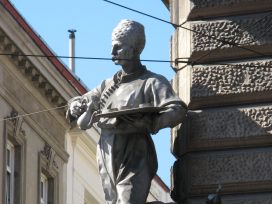Almantas Samalavicius: All over the world, institutions of higher education and universities in particular are being required to produce an enormous amount of first-class research and at the same time to be very sensitive to the demands of the labour market, to providing ‘useful’ or top put it more bluntly ‘marketable’ knowledge. How do these tendencies affect the higher education system in central Europe and Slovenia in particular?
Ana Hofman: The commodification of knowledge makes the economic role of universities and research institutions focal, strongly affecting the central European and Slovenian academic landscape. The tendencies of the current neoliberalization of higher education are visible in decreasing governmental funding and the competitiveness it fuels, the increase of short-term contracts for academic staff, and scientific production governed by funding structures. However, I think that we should be careful about generalizing these processes, since they take different forms in different environments. The neoliberalization of academia is an ideologically and structurally multifaceted process that influences the daily work and lives of students and academic and administrative staff in different ways.
In the post-socialist setting of Slovenia, where the global economic crisis led to radical cuts in public funding (around 16 per cent less funding for higher education and up to 25 per cent less for research from 2013 onward), higher education and research are under visible pressure. Due to this austerity policy, research is increasingly evaluated from an economic perspective; this fosters the commodification of academic knowledge production. This is followed by what Oili-Helena Ylijoki calls ‘new managerialism’, with a gradual yet visible shift toward a corporate model of administrative structure.
However, the budget cuts do not influence all academic institutions and departments in the same way. Research-oriented institutions are under pressure to seek new sources of income. Their reliance on short-term ‘project financing’ makes the academic staff’s position precarious, regardless of career stage and position, since existing ‘programme financing’ cannot cover the salaries of all the employed academics. The National Research Agency’s calls to fund research projects are postponed every year, which causes insecurity and jeopardizes continuity. Researchers are increasingly encouraged to compete for additional money from European projects or, more often, from business and third parties, which usually results in applied rather than research-oriented projects.
All this has caused a radical reshaping of the academic environment, with diminished cooperation and solidarity between institutions and departments. The gap between research-oriented institutions and universities that existed under socialism continues in the form of new tensions between predominantly research-based and predominantly teaching academics. Those who should be dedicated to research must fundraise constantly in order to retain their affiliation, while the teaching staff at universities is overloaded with constant logistical and administrative tasks. We can trace a growing generational and disciplinary inequality among academic staff; those who enjoy the ‘privilege’ of tenure have little empathy for the colleagues who hold unstable and short-term positions and are unable to advocate for themselves.
In Slovenia, as in many European countries, the allocation of public funds is based on quantitative criteria that include, apart from points amassed by publishing, the assessment of the amount of external funding each staff member brought to the institution. The quality of work is also under surveillance, since academics are expected to produce not only more but also better results in a shorter period of time. The dominant norms of academic excellence and desirable behaviour – scientific productivity in a publish-or-perish culture – have marginalized not only non-commoditised research, but also vulnerable individuals and groups, such as early career, academic staff with temporary positions, women, minorities and migrants (Nikolaidis and Maroudas, 2013: 137). This makes it impossible for them to navigate between building an academic career under the constant pressure of precarity, and simultaneously confronting the hegemonic structures of academic labour. This makes it easier to impose the corporate model of education and diminishes the possibility of practicing critical thought, socially engaged research, and new forms of knowledge production. Thus, we are witnessing a decrease in research autonomy, which, particularly in the case of the precarious academics, entails numerous ethical, methodological and strategic dilemmas and challenges.
The significant cuts across the higher education and research system, particularly since the global economic crisis, have brought a new perspective on the autonomy and the role of the academic as a figure who controls knowledge production and scholarly discourse. Many critical voices are warning about the role of academia as a centre of critique, claiming that it increasingly serves the status quo and that ‘autonomous science’ does not exist in reality.
The education of character, as proposed by Cardinal John Henry Newman in his classical treatise on an idea of a university, is hardly something that concerns institutions of higher education today. Many complain that universities have abandoned their commitment to teaching and educating in favour of profit-oriented research. Do you think teaching is still an important part of university ‘business’?
Teaching is increasingly perceived as a ‘sticky floor’; the current structural organization and new global tendencies undervalue it. Teaching positions do not provide sustainability in the academic market, since obtaining permanent positions is based on highly competitive, research-based recruitment criteria. Many postdocs and newly tenured researchers/academics who were interlocutors within the EU-founded project GARCIA testify to the undervaluing of teaching on the university and the department levels and to the increasing division of academic labour between research and teaching. One of the reasons for this is the implication of the ‘Bologna system’ that affected massification of higher education, including access to PhDs. Institutions try to obtain a maximum number of doctorates, with the result that the number of postdocs and assistant researchers with temporary contracts is rising significantly, without an equivalent or proportional number of permanent academic posts. The temporary teaching contract therefore becomes the prevailing form of employment for academics in the early stages of their careers.
In Slovenia, we can trace the increase of temporary contracts particularly in the case of women and people at the beginning of their academic careers. According to the data of the National Statistic Agency for 2009, 80 per cent of male PhDs and 74 per cent of female PhDs were employed with permanent contracts (SOSR 2011). However, from 2012 onwards, the number of temporary contracts increased: 64 per cent of male PhDs and 55 per cent of female PhDs had only temporary employment. Doctoral and postdoctoral students increasingly take temporary jobs and become a cheap source of teaching staff, performing ‘invisible’ labour. On the other hand, the usual recruitment practice in Slovenian higher education and research institutions is strongly marked by ‘academic inbreeding’. Institutions prefer to employ academics they have trained themselves; those who have no prior ties to institutions and departments rarely get a position. In this way, institutions remain closed, and many excellent early researchers are unsuccessful in launching a academic career.
The global economic crisis has also brought a peculiar ambiguity to academic labour. On the one hand, temporary employment involves greater flexibility and autonomy. New graduates entering the job market are advised to adjust to shifting conditions and to develop business skills and entrepreneurial thinking, since they are entering a dynamic sector. In public discourse, young researchers are presented as ‘independent professionals’, although they share the fate of other precarious workers (see Armano, Emilliana and Murgia, 2015). The imperative to constantly meet criteria for the potential renewal of their contracts turns early career academic staff into a cheap labour force that struggles with overwork, hyper-productivity and competition, and that often suffers from burnout, anxiety, isolation and difficulties managing family life (particularly in the case of women). Teaching is thus seen as important only if approached through the lenses of business, capital accumulation and dispossession. This diminishes the idea of teaching as civic engagement, and corrupts an emancipatory pedagogy that is politically aware and intervenes in reality – in my opinion, a very dangerous tendency.
The humanities are the ‘usual suspects’ in a modern society where the ideology of scientism took hold a long time ago. In recent decades, programs in humanities (or what we call liberal education) have become fewer because they are viewed either as relics of some sort of suspicious ‘tradition’, or as providing no useful and applied knowledge. What do you think are the prospects of liberal education? Does society need it? If so, how can policy makers be persuaded?
I come from the small disciplinary field of ethnomusicology, which has attained institutional recognition but still struggles for its place within higher education and research organization. In a situation that puts the arts and humanities under pressure to produce ‘applicable’ research, the field is threatened with further marginalization. On the other hand, the sub-field of applied ethnomusicology that emerged in the early 1990s is now becoming more prominent, following a tendency to pragmatism in the face of market pressure. It reflects the trend towards a shift to applied research, based on the false stance that accumulated scientific knowledge is not profitably exploited. Although applicability tends to be presented and understood as a multifaceted and dynamic praxis of producing socially-engaged knowledge, its general trend has been to value commercial and profit-led knowledge application.
In such an academic landscape, we need to rethink applied knowledge beyond the ideology of a career path driven by the job market (and market values in general). Despite the best intentions, applied scholarship is increasingly seen through the lens of employability and decreasingly perceived and presented as a beneficial intervention in society, led by ethical principles and social responsibility. I think that we need to feel threatened by such ‘developments’ that lead toward a new understanding of the role of academic as completely obliged to pursue profit-driven goals. This kind of societal need for ‘applied’ knowledge leaves little room to pursue projects that propose socio-political engagement as knowledge-producing praxis. We risk completely losing the idea of the humanities as a field of emancipatory knowledge production.
The American research university has been the model institution for the large part of the last century. University ratings have become extremely important globally, as well as other factors prompting European institutions of higher education to compete with much-envied USA research universities. What do you think of this competition? Do we need to have a MIT or Harvard in each country in eastern or central Europe? Or should local higher education institutions try to work on what they are good at?
The first question is who defines what ‘first-class’ research and institutional models and how they do so. Academics are not one homogenous community, so social differentiation and inequalities are inscribed in our possibility to work and do research in the first place. Under such conditions, epistemological power games are used to sustain colonial power relations. This is visible in, for example, in the success of so-called ‘new European’ universities and research institutions in projects funded by the European Commission. in which just few of them act as project coordinators, yet regularly serve as partners. This proves that they are losing a race, not necessarily against the higher-class researchers, but with limited access to resources, better-developed administrative offices and hired consultants. The gap between the position of a scholar from some ‘highly ranked’, ‘First World’ university and one from the ‘rest of the world’ is, at the beginning of the twenty-first century, and particularly since the crisis of neo-liberalism, greater than ever.
The emphasis in higher education and research institutions on ‘competition’ over collaboration secures privileges, including good services and access to funding, for scholars with higher positions, top universities and leading scientific fields. This weakens solidarity among academics and the potential for collective resistance. Instead of resistance, academics choose compromise and conformism. Stable academic positions are increasingly restricted to a minority and becoming more closed. As a result, research and teaching are produced by an elite, homogenous group of academics who impose one particular current of thought (still white, Western and male) and reproduce or amplify (rather than reduce) social inequalities. We need to be aware that knowledge production in the First World means, alongside the exploitation of academic labour, the reproduction of racial and class inequalities.
And finally – what are the most urgent goals of higher education and research in Slovenia in the next decades? What are the most important challenges to be overcome?
We often hear that the current model of public higher education is unsustainable, while the gap between public and private institutions is gradually increasing. In Slovenia, it is possible to trace the increase in the number of new private universities and institutes and the foundation of research groups in the business sector. This also proves a tendency towards the privatization of higher education and research. Public institutions are constantly threatened by budget cuts, which cannot simply be taken as an economic category, but rather as an ideological, representational and symbolic undertaking that opens up new relations between knowledge production and power. The new managerialism propagates an understanding of academic labour that corrupts the practice of scholarship as a collaborative and collective work.
The most important challenge we face as academic labourers is to take shared responsibility and put working conditions in a wider debate. We need to share personal struggles, feelings and strategies, and we need to display an active stance towards our vulnerability. The perspectives and concerns we have inside the academy easier need to be shared with the general public. Maybe I am romanticising, but I believe that our anger and frustration can be turned into a ‘politicized response’ to the gradual yet radical changes in the conditions, concepts and practices of knowledge production.
I would like to thank Tanja Petrovic for her comments and suggestions, which helped me shape my answers more precisely.






